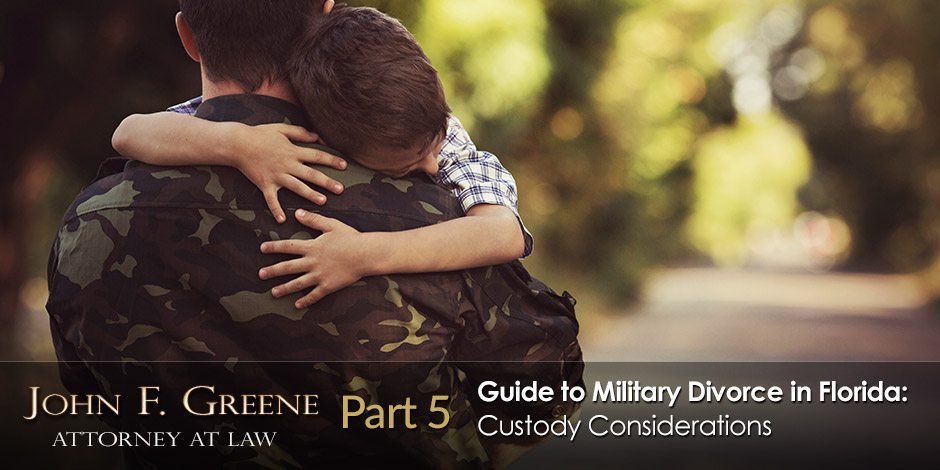
One of the most important considerations in any Florida divorce is custody, and Florida military divorces are no exception to this general rule. That said, there are unique custody considerations that may affect a service member’s Florida divorce. Here are a few of the issues service members should be aware of when it comes to custody and visitation in Florida.
The Frequency of Deployment
In a military divorce, courts will make a custody determination based on the best interests of the child/children. The frequency with which a military member deploys plays into this analysis. If a service member deploys often, courts are more likely to decide that it is in a child’s best interests to live with the parent who does not deploy.
If the court does decide that sole or primary custody should go to the non-deploying spouse, this may also affect child support payments. Deployment will typically mean that the child is unable to visit the deployed parent, which places larger childcare duties on the non-deployed spouse. Courts will take this into consideration, which often translates to increased child support payments for the deployed parent.
Temporary Leave
When an active military member deploys, Florida law provides protections for that parent’s legal rights. Florida lawmakers protect the parent’s rights in one of two ways.
First, no change may be made to the parenting plan while the parent is deployed. Florida law explicitly forbids a court from modifying parental plans and/or timeshare agreements while a parent is away on deployment. An exception can be made, however, when it can be clearly proven to the court that a temporary change is in the best interests of the child. This exception exists because Florida law consider’s the interests and needs of a minor child above all other considerations when it comes to custody and visitation.
The second way a deployed parent’s rights are protected is available for parents who deploy for at least 90 days. If the 90-day deployment threshold is met, Florida law gives the service member authority to designate a caretaker for the child. The designation of a family caretaker under Florida law is limited to a:
The designation of a family caretaker under Florida law is limited to a:
- Stepparent
- Grandparent
- Relative by marriage
This designation must be made in writing and must also be given to the other parent at least 10 days prior to deploying.
Parental Relocation in a Florida Divorce
When a parent wishes to relocate 50 miles or more in a Florida military divorce, court permission or permission from the other parent is a legal requirement. This requirement holds irrespective of which parent desires to relocate. Florida courts operate under the presumption that having both parents nearby is in the best interests of the child, until proven otherwise.
If a service member receives orders to relocate, he or she is not relieved of this requirement under Florida law. The service member must either receive the consent of the other parent or take the matter to court to settle the relocation dispute.
John F. Greene is a Destin military divorce attorney who helps clients effectively navigate the custody considerations of a Florida military divorce. The final installment in the Guide to Military Divorce highlights why an experienced Florida military divorce attorney is a must for handling any and all your Florida military divorce issues.
Contact Destin divorce attorney John F. Greene or call 850-424-6833 to learn more about how John F. Greene is the attorney you need for your Florida military divorce. John’s Destin office offers military divorce representation to the City of Destin, Niceville, Fort Walton Beach, Santa Rosa Beach and the Panama City areas.









